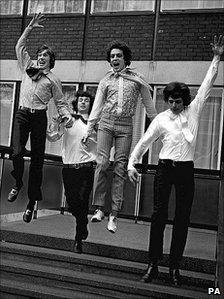Pink Floyd drummer Nick Mason gives advice to new bands
- Published

Nick Mason says music has "become the free toy in the cereal"
After 40 years in one of the world's best-selling groups, Pink Floyd drummer Nick Mason is helping new artists avoid the music industry's pitfalls - but says things are tougher for bands today.
When Pink Floyd signed their first record deal in 1967, you had three ways to hear them - go to a concert, hope they were played on pirate radio or the embryonic BBC Radio 1, or buy a bit of black plastic.
Today, you can still hope to hear them on the radio, buy the black plastic or some shiny silver plastic, download them from digital stores like iTunes, go to an unauthorised file-sharing service, watch YouTube, stream from websites like We7 or wait for the brain implant.
"When we started no-one could see beyond vinyl," Nick Mason says. "Then there was the cassette revolution, then there was the CD and it just goes on and on. And one never quite foresaw how it would pan out."
The contract lawyers did not foresee it either - which led the band to take EMI to court earlier this year to decide whether a pre-download deal applied to digital sales.
But today's deal-makers are taking no chances, Mason says.
"They're already preparing for intergalactic travel and what will be sold on Mars.
"We're prepared to sell in any territory at all.
"But we'd certainly want to make it quite clear that the fact we're just available on the planet Earth at the moment, does not mean that rights are not ours in perpetuity on any other planet or star in the galaxy as we know it."
This is said with a wry smile - but his deadpan voice leaves no doubt that they would send lawyers to the dark side of the moon if The Dark Side Of The Moon ever did come to be heard there.

Pink Floyd last performed together at Live 8 in London in 2005
He is making the point that the rules of the music world have changed beyond recognition, and are still changing.
For the Ferrari-racing drummer, 66, this is inconvenient and a little baffling.
But for new artists, it is the difference between success and failure, he believes.
"It's so much tougher now to even make a living, but to break through and become a world act is really difficult."
Mason is now co-chairman of the Featured Artists' Coalition, a group set up to educate new acts on how best to navigate the booby-trapped path through the music industry and to speak up for musicians' rights.
Asked whether he would like to be in the shoes of a new band in 2010, Mason replies with a horrified: "No!
"No, I think we were incredibly fortunate for all sorts of reasons. It was clearer how to go about things, what was needed to make it happen. We had opportunities that I think most bands today would not have.
"The fact of the matter is that 40 years ago, unless you bought the record, you couldn't hear the music. It was such a narrow track in comparison to today."
Talking at the In the City music convention in Manchester, Mason says most new bands are more dedicated and better musicians than Pink Floyd were when they started out.
"There were a lot of gifted amateurs in my day. Most of the kids now play fantastically well.
"I think there are so many bands around now who might get there, but it's a tougher journey."
The public's interest in music is now centred on X Factor, not artists writing their own material and emerging under their own steam, he notes ruefully.

Pink Floyd burst onto the music scene in 1967
"X Factor is big news - well 40 years ago The Beatles were big news."
And rather than being valued in its own right, music, he suggests, has "become the free toy in the cereal".
The impression of a curmudgeonly rock veteran is lessened a little by his willingness to help young artists learn from Pink Floyd's mistakes. While the landscape has changed, the fundamental lessons remain the same, he believes.
"One tends to look back at the mistakes as the same thing - relinquishing control of something at some point in your career.
"It's difficult because, almost inevitably, that's how it works - you give someone the rights and then, some years later, you come back and regret it because you've given away too much or it's going to take a very long time to ever regain it."
Pink Floyd regularly negotiate with their record label EMI, he says, as new developments arise.
The court case in March rested on whether the record label had the right to split up Pink Floyd's concept albums and sell individual tracks online.
Download dilemma
The question of whether tracks should be sold separately is met with a long pause as Mason considers the collision between artistic integrity and digital reality.
"It's better that people can download the tracks and pay for them than download the tracks for [free]," he replies.
"To some extent we're in a situation where we have to make them available through iTunes and we'd like to control that as far as we can.
"What we'd like to do, say with Dark Side, is to say: 'No you can't download one track. It's an album.'
"It's a bit like, if you were a writer you wouldn't particularly want people to say: 'I think I'll take chapter three and chapter 17, but I don't really like the rest of it.'"
Musicians from the iTunes generation may accept the new reality more readily. But it remains to be seen whether any of them will match Pink Floyd's universe-straddling success.
- Published16 October 2010
- Published27 May 2010